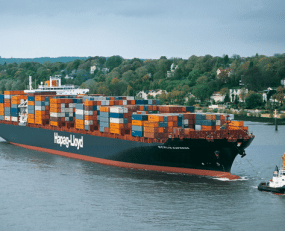
The Port of Hamburg announced last week that it has received permission from relevant authorities to start dredging the approaches to its terminals. This decision is key to the future viability of Hamburg as a leading port in the region.
Hamburg sits just over 100 km from the mouth of the Elbe river, making it a tidal port but with a river approach. The effect is that Hamburg’s ability to accept the very largest vessels varies throughout the day with the level of the tide. This complicates the handling of large vessels substantially. The new dredging project will deepen the approach to a minimum of 13.5 m, which ought to mean that the very largest vessels can enter or leave the port at any time.
The issue of dredging the Elbe has been politically controversial for 20 years. Environmentalists complain that the level of silt displacement damages the river and local water drainage system.
The inability of Hamburg to take the very largest vessels has been crippling to the port’s ambitions. At one time a rival to Rotterdam as the largest container port in Europe, it has now fallen behind Antwerp in terms of numbers of containers handled despite the Belgian port also being on a river location.
At the beginning of this century it was assumed that Hamburg would benefit from the growth of Central European and Baltic economies, yet the most recent half-year results saw a fall in container volumes of 2.7%, a major element of which was a loss of Baltic transhipment traffic. In contrast, both Antwerp and Rotterdam have seen consistent single figure percentage increases over the past several years. In the case of Rotterdam, the opening of Maasvlatke 2 has delivered a dedicated terminal for the largest vessels.
Indeed, such has been the growth of the Dutch and Belgian ports that land-side infrastructure is becoming congested. This offers hope for Hamburg’s future prospects. At the end of last week, THE Alliance announced that it would shift its port of call for transatlantic services to Hamburg, albeit at the expense of neighbouring German port Bremerhaven. It will be interesting to see if Hamburg can regain business from Antwerp and Rotterdam as well.
Source: Transport Intelligence, August 28, 2018
Author: Thomas Cullen